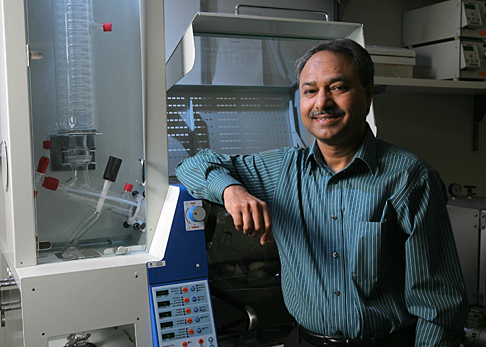Dr. Abdul-Majeed Azad, UT professor of chemical engineering, has been selected as the recipient of the 2010-11 Fulbright Distinguished Chair Award in Alternative Energy Technology.

Dr. Abdul-Majeed Azad works in the North Engineering Building Materials Research Lab, where the Hiedolph LR20 rotary evaporator is used for large-scale catalyst synthesis and for coating catalysts on honeycomb monoliths.
“I’m extremely grateful to the Fulbright Foundation for this prestigious award,” Azad said. “This recognition is a testimony of the tremendous support of my family and friends and the faith that so many colleagues across the two campuses have in me.”
The U.S. Department of State’s Bureau of Educational and Cultural Affairs administers the Fulbright awards, which are designed to increase mutual understanding between the people of the United States and citizens of other countries.
Distinguished Chair awards are viewed as among the most prestigious appointments in the Fulbright Scholar Program. Chair holders have a prominent record of scholarly accomplishment. They also have a high degree of visibility and are frequently asked to provide guest lectures and represent the program in other ways in the host country.
The program comprises about 40 distinguished lecturing, distinguished research and distinguished lecturing/research awards spanning a wide range of academic disciplines.
Officials with the Fulbright Scholar Program said Azad stood out because of his international recognition in the field of alternative energy research. He has authored more than 90 peer-reviewed publications, has participated in a number of conferences, possesses several patents, and achieved significant grant funding.
In addition to this outstanding research, Azad consistently has been evaluated well by his students.
His work as a Fulbright Scholar will involve improving the Chemical-Looping with Oxygen Uncoupling (CLOU) process for the capture and storage of carbon dioxide that is being employed at Chalmers.
Azad’s proposed research at Chalmers aligns well with his own work at UT, where he has independently developed technologies that utilize rather than sequester carbon dioxide. The sequestration method involves pumping the greenhouse gas underground into depleted coal and natural gas mines after it is “scrubbed” from the air during the burning of solid fuels such as coal.
Utilization, on the other hand, generates synthetic gas, also known as “syngas,” by combining carbon dioxide and water vapor that could then either be used as a fuel in solid oxide fuel cells or converted catalytically into liquid fuels via the Fischer-Tropsch process.
Azad also is working with NASA on this technology as well as with the Battelle Memorial Institute for its possible commercialization.
“Dr. Azad is a great asset to this university and is a fine representative of our commitment to be a transformative leader in renewable energy,” Dr. Nagi Naganathan, dean of the UT College of Engineering, said.
“The Fulbright Award is an affirmation of his accomplishments in this area as well as our commitment,” Naganathan added. “It is great to see Dr. Azad have the opportunity to share his valued talents in an internationally collaborative fashion.”